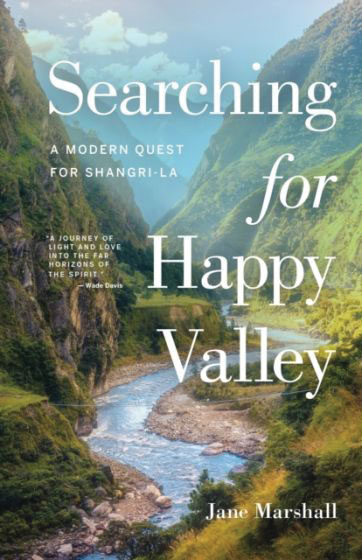In these distracted, fast-paced, detached times, how does one access peace, contentment and a place in the universe? Jane Marshall, an Edmonton-based writer, yoga teacher, mother and consummate traveller, explores this question in her memoir of three unique places—Morocco, Nepal and Alberta’s Porcupine Hills—as she aims to “reconnect with nature” and to comprehend ways of living that have been mostly lost in centuries of “industrialization” and colonial destruction.
Beginning the book with a short sojourn to Aït Bougemez (“Happy Valley”) in Morocco with her family in 2014, where “[l]ife and death are apparent… naked and raw… real and unhidden,” Marshall then takes us to southwest Alberta’s Happy Valley, exploring its complex realities with first her 87-year-old grandmother, then later her friend Amy in 2017, then solo in 2018. After hearing tales of Indigenous cultural decimation from Conrad Little Leaf and Ken Williams (Blackfoot/Soki-tapi), Marshall is invited to a Sundance ceremony. Here she is witness to healing rituals, complete with smudging and piercings, and comes to harsh realizations that the land that was once a “pristine place” is now “altered with machinery, the blazing fire plugged and repressed.” At the end of this section she takes her family to a sweat lodge ceremony and asks for the vital guidance she requires to write this book as a Western woman seeking Indigenous teachings so she doesn’t “make mistakes, or tell the story in the wrong way.”
Part three is the most extensive segment of the book, covering her third trip to Tsum Valley, Kyimolung Beyul, in Nepal. Structurally, her prior sojourns to this land would have made wonderful initial material as bookends for the Moroccan and Albertan quests, because it’s in this section that we finally learn in detail about her fascination with magical-feeling endangered spaces. In Nepal she travels in the Himalayas with a guide, Tanzin, a nun, Ani Pema, and others, enduring terrifying climbs, risky conditions and benefiting from the teachings of Buddhist lamas and her gentle hosts. Mentioning the shifts between 2012, when she couldn’t even shower, and 2019, when there is “solar power [and] wi-fi,” Marshall reflects that she’s most “at home where there are no buildings at all.”
At times Marshall’s yogic tone can be galling and her writing can become borderline offensive when reaching for accessible similes (“the traditional garb of the mountain people… looks just like what Obi-Wan Kenobi wore in Star Wars”) but overall, Searching for Happy Valley is a compelling account of one woman’s intent to live in the world intensely, showing us that while it’s never an easy trek, it’s always deeply worthwhile.
Catherine Owen is the author of Riven (ECW Press, 2020).
_______________________________________


